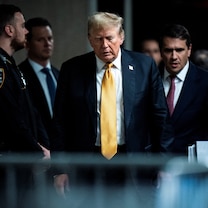The depths of police power in American history explored in new Yance Ford documentary
After George Floyd death, there was a change in policing, filmmaker says.
After the death of George Floyd in 2020, filmmaker Yance Ford says he observed the police response to protests across the country. He noticed that there was something different about the way the police were handling these protests.
Ford says the response felt more aggressive and militarized compared to what had happened in the days before Floyd's killing. It seemed like a step backward in the militarization of police.
He decided to produce a film that explores the scope and scale of the American police over hundreds of years, tracing the money, political power and bipartisan support that have created modern policing.
ABC News sat down with Ford to discuss his film, "Power."
ABC NEWS LIVE: Our next guest is an Oscar-nominated producer and director who has received praise for their 2017 film "Strong Island," which won the Sundance U.S. Documentary Special Jury that year, along with many others. Now they're taking on the untold history of American policing in the thought-provoking documentary "Power."
ABC NEWS LIVE: Yance Ford joins us now in studio to discuss the film. Welcome to the show, Yance.
YANCE FORD: Thank you, Linsey
ABC NEWS LIVE: What initially sparked your curiosity about policing?
FORD: So it was summer of 2020, after the murder of George Floyd. And I was watching the police response to protests. You know, in response to his murder around the country. And there was something different about the response of police to those protests. It felt, there was just something intangible. It just it felt more aggressive. It felt more militarized, for sure.
And after what we had seen in Ferguson, it felt like we weren't actually taking a step backward from the militarization of police. It felt like we had taken a step forward. And so I started asking the question, 'Is this what police are for in a way that I hadn't asked before?' And it led to essentially the development and production of this film.
ABC NEWS LIVE: Do you think that enough people are invested in having this conversation? Because I know that in the Black community, this is something that's talked about often, you know, to the point of joking about, oh, driving while Black or whatever. But do you think that there are enough people really talking about it to actually impact change?
FORD: I think that people really want to talk about the definition of public safety and what public safety means to their communities. And if by showing people through this movie how we got to have the policing apparatus that we have today, I think that we can actually give people a common point of reference and a place to start to move that conversation forward.
ABC NEWS LIVE: There are a lot of various conversations happening in this moment in time about policing, in particular the protests that we've seen, on campuses across this country in recent weeks. And I'm curious on, on both sides, how it's been handled, what you think about the policing when it comes to college students.
FORD: When I see, you know, the college protests that have been happening and the police response to those protests, it takes me right back to 1968. And it really demonstrates for me how policing has expanded over time and how the response to civil unrest has really become as militarized, you know, in policing as the response to crime has, and, you know, when we talk about the people's right to protest, you know, that's protected.
But what's not so clear is what the police response to protests should be. Which is one of the reasons why in power we look at this relationship to property, and how that relationship to property ultimately led to the abolition of police, as opposed to this idea of public safety.
ABC NEWS LIVE: Do you think that there has been an evolution over time, the way, for example, if you're talking about '68 until now, what, more than half a century ago, do you think that there has been a change in police response?
FORD: Over the half century that has happened, since 1968 and the protests that swept the country then, I think that policing has become more militarized, not just in the, in the equipment that they use, but in the mentality toward the people that they serve. And I think that that's ultimately one of the scariest things about police in relationship to our democracy because it begs the question: Who is more powerful, the people or the police?
ABC NEWS LIVE: What do you see with regard to the future of policing?
FORD: There has to be a moment of reconciliation, right? We have to reconcile the definition of public safety that meets the needs of the vast number of communities in this country with a role that police will play in that definition of public safety that really moves people toward a sense that everyone is protected. That that policing isn't just about moving people out of one place and keeping, you know, other people safe, but it actually is about a community approach to safety that involves everyone.
ABC NEWS LIVE: Yance, we thank you so much for coming by. I want to let our viewers know "Power" is now available to stream on Netflix.




